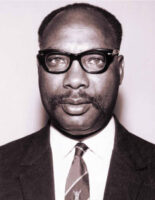In his sunset years, Jackson Harvester Angaine styled himself the “King of Meru”. He will be remembered as the minister who had the trickiest docket in independent Kenya: Settling millions of landless Kenyans in the former White Highlands.
He also played a leading role in creating an African propertied class, leading to gross inequities in property, especially land ownership. Angaine bestrode the Ministry of Lands and Settlement like a colossus between 1964 and 1979, when he first lost his parliamentary seat.
Born in 1900 at Gautuku village, Ntima location, Meru, Angaine joined the United Methodist Missionary Society School at Kaaga for primary education in 1913. He later went to Alliance where he was a class ahead of Odinga. The son of Paramount Chief Angaine M’Itiria, Angaine distinguished himself at Alliance as a boxer. He did the London Matriculation course, but did not join university. He instead opted for a job as an accountant.
His political career started when he joined KAU and became the Meru District chairman. KAU did not have a national figure to galvanise the populace. The return of Kenyatta, with his British experience, offered KAU the political mobilisation this required. It educated its supporters on their political and social rights.
With Kenyatta at the helm, and working with a coterie of young politicians, KAU ignited passion across the Gikuyu, Embu and Meru region. It then spread to other areas and, before long, it had leaders at the national and at district levels. Angaine was the leader among the Ameru, a position that elevated him to the centre of national politics.
With KAU split between radicals and moderates, the former rubbishing the latter’s call for negotiations, the party provided the political thrust required for the emergence of the Mau Mau, whose main leader, Dedan Kimathi, was the Ol Kalou KAU chairman. Angaine’s Meru backyard, adjacent to Mt Kenya Forest, was the base of the organisation.
But on October 9, 1952, Kung’u Waruhiu, a Paramount Chief appointed to oversee colonial rule in central Kenya, was driving to a Seventh Day Adventist mission when the Mau Mau struck. They sprayed his US-made Hudson car with bullets. This assassination was the first signal that the Mau Mau were determined to change Kenya’s politics, if need be, by force.
The murder ignited a call among the settlers for decisive action against the KAU leadership, whom they argued was behind the attacks on European farms. Less than two weeks after Waruhiu’s funeral — October 20, 1952 — a State of Emergency was declared and Operation Jock Stock was launched, targeting KAU leaders and the Gikuyu, Embu and Meru communities. The terror spread significantly in the so-called White Highlands as thousands of Kikuyus, Embus and Merus were arrested. The central Kenya economy was blockaded.
Angaine could not escape the colonial dragnet. He was detained in Kajiado, Mackinnon Road, Hola and Manda Island. The last one was a hardship area for nationalist prisoners thought to be the ringleaders of Mau Mau. It was at Manda that Angaine lost most of his teeth. He was considered a hardcore criminal and was nearly starved to death.
